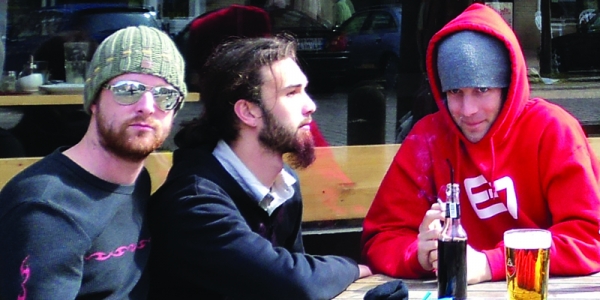It makes sense then that Thomson would continue to spread his wings and seek new ground. For the time being, he’s landed as Publicist, a one-man band that mixes live drums, vocoded vocals and spacey synth bass lines that find their homes in neon dance clubs. While the charisma of Trans Am’s live performance is still evident, it’s still quite the jump. Many artists set up shop within a confined genre, but Thomson has managed to make the music of Publicist sound natural and not forced in the least. While he concedes that he has made music in different genres, he’s still quick to point out that there are similarities.
“It’s true that I’ve worked in different genres but in the grand scheme of things they had some big similarities,” stated Thomson, answering question via email. “Even the rock music I made was rhythm based and very minimal. I think maybe I’ve just found different outlets for similar musical goals. I think it’s also important to remember that every style has its good and bad examples, and one should not judge a genre only by its worst practitioners.”
Still, Thomson acknowledges that his work with Trans Am and Weird war has influenced what he does with Publicist.
“Well the most obvious way is that I use a live drum kit when I perform. There is something very visceral and exciting about live drums that knob twiddling can’t replace. Also my songwriting in Publicist is more traditional in the sense that my tracks have verses, choruses, and solos, something that a lot of dance music does away with.”
To make the leap from rock music to dance music is not an easy one. It’d be difficult to think of two more divisive genres; bridging the gap between the two is a task that even UN Peacekeepers would scoff at.
A large part of this division is the crowds that each respective genre attracts. Preconceived notions abound; but Thomson has spent more than his fair share of time travelling the world, seeking to understand the music he was surrounded by. When questioned as to whether geography has played a part in the music he’s made, he notes that it’s a constant influence.
“Definitely. I lived in Brazil and Argentina as a young child and my earliest musical memories are of batucada music and of my parents having pretty crazy parties; lots of dancing and live percussion. Then living in DC was a big influence as far as having a DIY ethic, what with the whole hardcore punk scene. And finally London taught me that dance music does not have to be only for douchebags.”
As Publicist, Thomson is seeking to break down any preconceived notions about dance music. With six EPs to his credit, his attempts manifest during live performances. Thomson thrives on keeping in constant contact with his audience; he performs not on a stage, but in the middle of the crowd that has paid to see him.
“It is very important to me. I’m not trying to create a recital experience, I’m trying to create an informal celebratory experience. Like when you go to a friend’s house party, your friend isn’t on a stage talking down to you. That would be weird.”
One might assume then that with his time spent in the trend-setting act Trans Am, Thomson’s attempts to change not only how dance music is conceived but how it is performed would be beginning to catch on. Though he’s keen to go against the grain, Thomson also understands that things won’t be changing that drastically anytime soon.
“Well the fact of the matter is that most electronic music performances are rather boring visually. Seeing one or two guys bob up and down behind a laptop and a mixing board is about as sexy as seeing someone check their email. I think most electronic performers need some kind of pedestal to add interest, so I don’t think this will change for most of them.”
Sure, so Thomson may not be able to change the face of dance music at this stage in the game. What he can do is maintain a level head about his place in the game. Towards the end of our interview, Thomson began to discuss the elements of a great house party. And though Thomson is indeed the kind of performer who refuses to be contained, it’s redeeming to know that he still respects and understands the house party. It’s where the music of Publicist began, though there’s no telling where it will soon go.
“For house parties people always think of the obvious-music and drinks. Yes that’s crucial, but lighting is also very important. Parties and club music are an experiment in psychology. We are trying to discover what makes people lose their inhibitions. Being bathed in dark disorienting light definitely makes people less self-conscious.”
BY JOSHUA KLOKE







